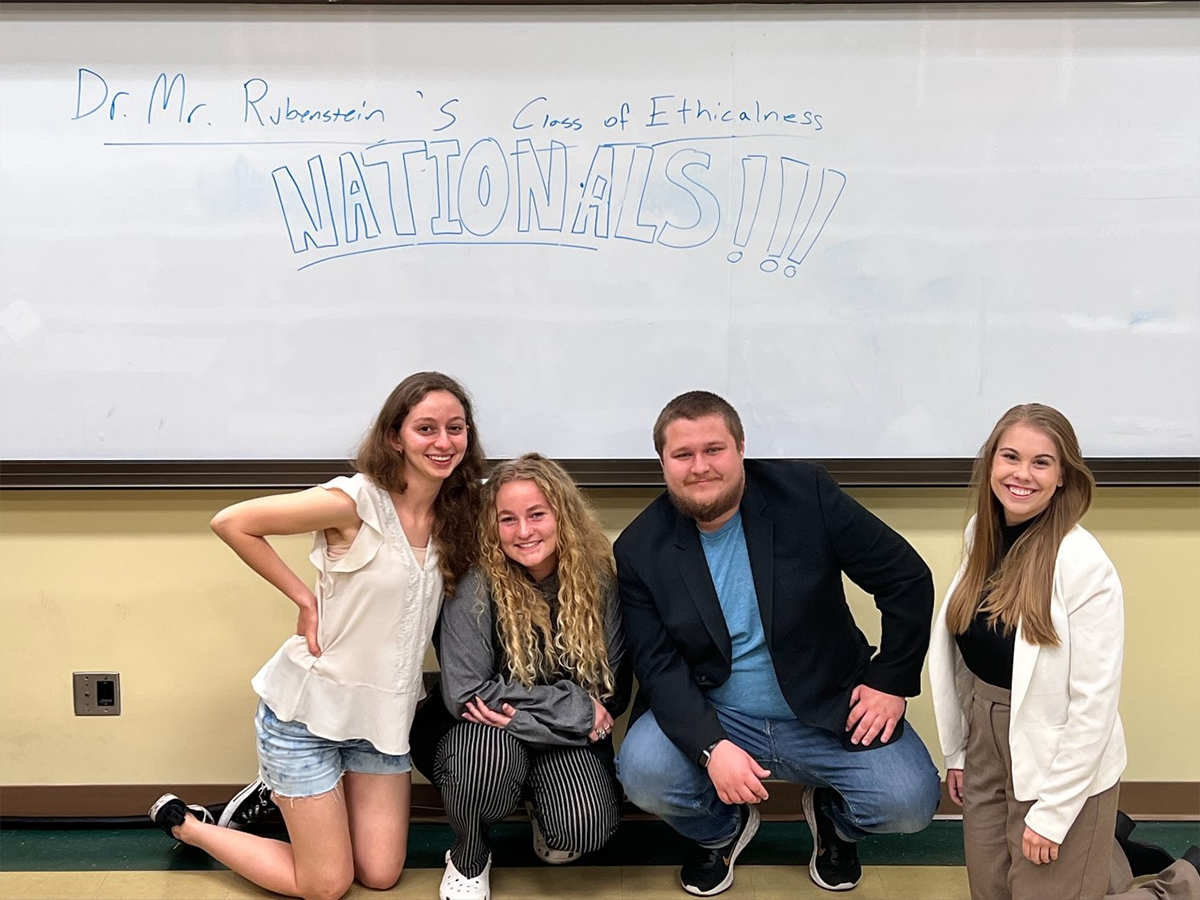Pictured above: (From left to right) Julia Linkogle, Liana Howe, Veli Adyoner and Tejin Jones make up USF’s four-member competitive ethics team.
Courtesy of the USF Ethics and Debate team
By Molly Ryan
Seven years ago, the Ethics and Debate Club first formed at the University of South Florida’s St. Petersburg campus to foster a space for free speech and discussion. Now, the club’s competitive ethics team represented USF on the national stage at the Intercollegiate Ethics Bowl (IEB) — which took place on Feb. 26 and 27.
Last November, USF’s four-member team was one of two who competed in the Southeast Regional Ethics Bowl to advance to the IEB after placing second to the U.S. Naval Academy in the third and final round — beating out fellow competitors like the University of Florida and The Citadel.
Out of approximately 150 university teams that competed in 12 regional competitions across the nation, only 36 qualified to compete virtually in the national championship hosted by the Association of Practical and Professional Ethics (APPE).
According to team member Tijen Jones, Ethics and Debate Club president and senior interdisciplinary social sciences major at the St. Petersburg campus, USF has been 1-3 (one win, three loses) at every regional competition they participated in prior to 2021.
“[The Southeast Regional Ethics Bowl] is one of the most rigorous [in the nation],” Jones said in an interview with The Crow’s Nest. “To make it undefeated in the preliminary competitions, take second place in regionals and then go to nationals was beyond belief.”
Prior to the competition, Jones expressed that the team “could not be more excited” to go up against universities like Yale in the national championship.
Jones is one of two St. Petersburg students on the team, alongside freshman history and anthropology major, Liana Howe. The other teammates — mechanical engineering major, Julia Linkogle, and political science major, Veli Adyoner — hail from the Tampa campus.
“[The team] tries to go into every Ethics Bowl with our heads level, just excited to be talking with other teams about the cases without any competitive expectations,” Howe said to The Crow’s Nest. “To make it to nationals was so incredible because we made it purely motivated by our love of discussion and passion for ethics.”
Each qualifying team is given 17 topical cases that center around social, political and professional ethics to study prior to the competition. An analysis is then prepared for each case by the teams.
In the months that led up to the national competition, the USF team held open discussions on the cases before coming to a consensus on each one. However, most of the preparation period consisted of practicing each case’s presentation where the coaches posed potential judge questions.
According to Howe, “These practices are challenging, but the relaxed environment allowed all of us to think creatively on the spot and be able to feel confident in the groundings of our cases.”
A case Jones found to be “complex” is one that addresses the ethicality of artificial intelligence in war.
“First you have to ask whether war is ethical in the first place and if an entity with no emotion or true understanding should be able to take a life,” Jones said.
Howe was “most excited” to discuss a case regarding “Free-Speech Zones” and hate speech on college campuses.
“Because freedom of speech is such a pressing, controversial question, talking about this case has been incredibly insightful and rewarding,” Howe said. “The diversity of viewpoints on our team has also made discussing this particular case very interesting and engaging.”
While the USF team read through each of the cases the night prior to the competition to prepare, Howe emphasized that the night was “also about relaxation.”
“So, most of [the night was] spent sitting, talking and eating some good food,” Howe said.
During each match, a moderator posed questions aimed toward exposing the deeper ethical dimensions of a selected case — wherein a panel of judges was tasked in asking for further justifications on the team’s evaluation.
According to the APPE, a team’s analysis was rated based on the following criteria: “Intelligibility, focus on ethically relevant considerations, avoidance of ethical irrelevance and deliberative thoughtfulness.”
While the competitive team is one aspect of the Ethics and Debate Club, it also offers weekly meetings geared toward free-flowing conversation.
“Everyone, regardless of year, undergraduate or graduate, alumni, ability to publicly speak or experience, is welcome to the organization,” Jones said.
Howe, who learned about the club through her freshman orientation, feels that it is important for all USF students to know about getting involved in clubs like Ethics and Debate.
“The first [reason why students should get involved with the club] is that we actively develop critical thinking skills necessary for making informed decisions in the world. The second reason is pretty simple: the people,” Howe said.
“This is a judgment free zone — anyone from any political, religious, or general ideological background is welcomed, and their viewpoint is genuinely listened to and valued,” Howe said. “These are some of the most open-minded, intelligent, caring and hilarious people I have ever met, and being a part of the team has truly been a blessing.”
The Ethics and Debate Club meets from 5 to 7 p.m. every Monday on Microsoft Teams. For more information, visit the club’s website at usf.edu/business/centers/ethical-leadership/ethics-debate-team.aspx or email tijen@usf.edu.



